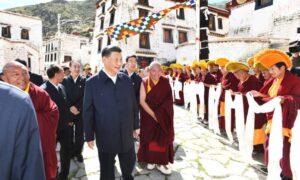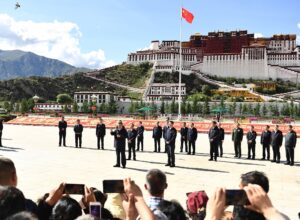
Photo: Xinhua
Chinese President Xi Jinping has visited Tibet – his first visit there since becoming President in 2013. The visit was unannounced by Chinese state-controlled media.
Following the visit, which took place between July 21 and 23, Chinese state media Xinhua reported, “Chinese leader Xi Jinping has stressed fully implementing the guidelines of the Communist Party of China (CPC) for governing Tibet in a new era and writing a new chapter of lasting stability and high-quality development for the plateau region […] Xi said over the past 70 years Tibet has made historic strides in the social system and realised full economic and social development, with people’s living standards significantly improved”. The report continued, “Xi stressed efforts to strengthen developing border areas” and mentioned “protecting the ecology of Qinghai-Tibet Plateau”. He visitedDrepungMonastery, and spoke of the “contributions the monastery has made in upholding the leadership of the CPC, supporting the socialist system and safeguarding national unity”. Xi visited Nyingchi, a Tibetan town close to the border with the Indian state of Arunachal Pradesh, which China claims as their own territory leading to ongoing border disputes; he travelled on the new Sichuan-Tibet Railway, designed to facilitate military presence near the border there. Xinhua་reports him as speaking of “border-area consolidation” and that he “stressed efforts to strengthen developing border areas”. He is shown as accompanied by ZhangYouxia of China’s Central Military Commission and a senior general in the People’s Liberation Army.
Phayul reports Xi as saying to local Tibetans. “As long as we follow the Communist Party, as long as we adhere to the path of socialism with Chinese characteristics, we will surely be able to achieve the great rejuvenation of the Chinese nation. . . All ethnic groups all over Tibet were marching towards a happy life in the future. We are as full of confidence as you.”་China’s globaltimes reports that his visit “showed the central government’s emphasis on boosting the economic growth and stability of TAR as well as improving local residents’ livelihoods”.

In front of Potala Palace
Photo: Xinhua
The visit has attracted the attention of the international media. Under the heading “First Chinese presidential visit to Tibet in 30 years” the BBC་་said, “China is accused of suppressing cultural and religious freedom in the remote and mainly Buddhist region.The government denies the accusations and says Tibet has developed considerably under its rule”.The Economist asks “Why has China’s President Xi Jinping Visited Tibet?” and says “The timing and initial silence about it in the Chinese press suggest unease about the legitimacy of Chinese rule there”, and goes on to suggest unease extends to the “political stability in the region” while Reuters says “China’s Xi urges people in Tibet to ‘follow the party’”.
RFA quoted their sources in Lhasa as saying that, “residents’ movements in the city were restricted and factories closed, with construction work halted and Lhasa’s iconic Potala Palace […] closed for the day”. The also reported that the flying of kites and drones in Lhasa had already been barred. During his visit, videos circulating on social media show Xitouring the Barkor Old Town part of the city.
Sophie Richardson, Human Rights Watch China Director, speaking to RFA said that Xi Jinping’s visit to Tibet was “certainly a surprise […] But the reality is that the person who ought to be strolling freely around Lhasa and the Barkor is His Holiness the Dalai Lama”.་Bhuchung Tsering, interim president of the Washington-based International Campaign for Tibet, said the visit “raises many questions”, adding, “It’s clear from the way President Xi Jinping’s visit has been kept secret that there is no stability in Tibet”.
RFA quotes London-based Tibet scholar Robbie Barnett as saying that thevisit may have been intended to signal to India that Xi Jinping is prioritising the issue of tensions along India’s border with Tibet.
Meanwhile in McLeod Ganj, the Tibetan Women’s Association་marked the occasion with a demonstration to coincide with Xi’s visit, to protest against the Chinese government’s atrocities against Tibetans and the celebration of the 100th anniversary of the founding of the Chinese Communist Party on July 1 of this year.




 Print
Print Email
Email